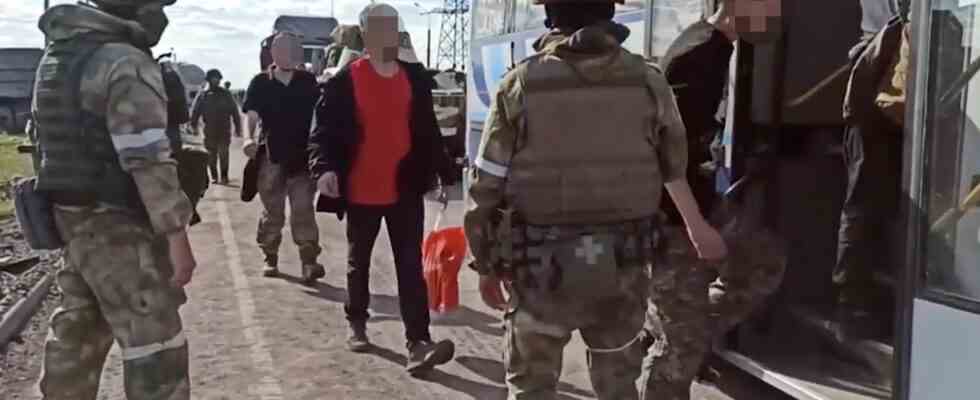Status: 05/26/2022 03:35 a.m
Almost all soldiers of the Azov regiment had to be taken prisoner by the Russians. The Supreme Court is now deciding whether to classify the battalion as a terrorist. Statements by Duma politicians do not bode well.
The Supreme Court will consider today whether Ukraine’s Azov battalion should be classified as a terrorist. For the fighters from the Azov steelworks in Mariupol, who were taken prisoner by the Russians, the decision is likely to have consequences.
Images of the fighters leaving the Mariupol steelworks are shown again and again on Russian state television. Drawn faces in close-up. raised hands. A long line of vanquished. Prisoners of war – from an international perspective. War criminals – according to many Russian MPs.
Ukraine relies on “negotiation process”
It’s the militant fascists who – contrary to what Ukraine had hoped – should never be replaced, Duma deputy Anatoly Wasserman demanded: “Starting with those who were directly involved in the killing of civilians, right through to those dealing with Nazi – decorate tattoos.”
The chairman of the Committee on International Affairs, Leonid Slutsky, went even further. He accused the Azov militants of monstrous crimes against humanity and called for the death penalty to be reinstated.
Statements that do not promise anything good. Deputy Defense Minister of Ukraine Hanna Malyar is pinning her hopes on the political messages being directed inward and aimed at propaganda effect. “As far as the negotiation process is concerned – it’s going on,” she says.
“The food is ok”
Whether a prisoner exchange can really be agreed behind the scenes, away from the public eye, is difficult to assess. In any case, the Russian Defense Ministry is trying to allay concerns that the fighters are not currently being treated according to international conventions by publishing pictures and statements from prisoners.
“The conditions are better than expected. We have mattresses, blankets. The food is okay. It’s enough to fill you up and even a little more,” says one of the prisoners. The commander of the Azov battalion Denys Prokopenko was allowed to talk to his wife on the phone. He told her that everything was fine. She had also heard from others that the prison conditions were more or less okay. The information cannot be independently verified.
conflicting parties as a source
Information on the course of the war, shelling and casualties provided by official bodies of the Russian and Ukrainian conflict parties cannot be directly checked by an independent body in the current situation.
Upstream tribunals?
If the head of the self-proclaimed Donetsk People’s Republic, Denis Puschilin, has his way, then the Azov fighters in Donbass will be put on trial. According to the laws in force there. Unlike in Russia, there is no moratorium on the death penalty.
Puschilin calls for an international war crimes tribunal. A corresponding statute is already being drawn up. “It cannot be ruled out that there will be upstream tribunals. Like after the Second World War.” It is known that before Nuremberg there were tribunals in Kyiv and Kharkiv, for example, he claims.
Classified as far-right since 2014
But Russia also has more than one way of taking criminal action against the Azov militants. Not only because many in the Donbass have a Russian passport. According to human rights lawyer Ivan Pavlov on his Telegram channel, it is already enough if a crime committed abroad is directed against Russia’s interests.
The charges could range from the “cruel treatment of prisoners of war and civilians” to the so-called “rehabilitation of National Socialism”. That alone could lead to long prison sentences under the most severe conditions.
Should the Supreme Court officially classify the Azov Battalion, which has been publicly branded as right-wing extremist in Russia since 2014, as a terrorist, the sentences are likely to be increased. Even if such a decision cannot theoretically be applied retrospectively.
The fate of the “Azov” prisoners of war
Christina Nagel, ARD Moscow, May 25, 2022 5:36 p.m

